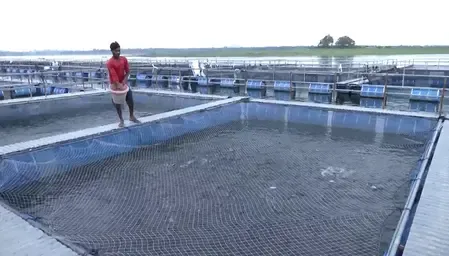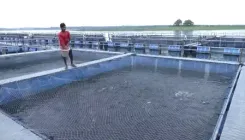How is the PM Matsya Sampada Yojana Changing Farmers' Lives in Jharkhand?

Synopsis
Key Takeaways
- Fish farming provides a sustainable income source.
- PMMSY has revolutionized local fishing practices.
- Community collaboration enhances the scheme's success.
- Training programs increased farmers' expertise.
- Self-reliance is now achievable for many families.
Hazaribagh, June 27 (NationPress) Fish farming through cage culture in the Tilaiya reservoir of Hazaribagh district in Jharkhand is emerging as a lucrative income stream for local residents. The Pradhan Mantri Matsya Sampada Yojana (PMMSY) has initiated significant transformations in the lives of the fishermen in this region.
Local farmers, who previously faced the need to migrate, are now achieving self-reliance right in their villages.
According to District Fisheries Officer Pradeep Kumar, cage culture was introduced in the Tilaiya reservoir around 2012-13 through minor initiatives from the state government.
Initially, fishermen took time to familiarize themselves with and implement this technology, but they gradually embraced and perfected advanced fish farming techniques.
Farmers also attended training sessions outside to learn how to conduct fish farming scientifically.
The success of these initiatives was further bolstered by the collaboration of the state government, district administration, and various organizations.
However, the introduction of the Pradhan Mantri Matsya Sampada Yojana by the government led by Narendra Modi has triggered a true revolution in the lives of farmers statewide.
Pradeep Kumar mentioned that there is no cap on beneficiaries for this scheme, leading to a substantial number of applicants, with most experiencing benefits.
Farmers residing near the reservoir, whose lands were inundated during its construction, are now crafting a brighter future through fish farming in the same waters. This has also strengthened their emotional bond with their lands.
A beneficiary, Pintu Kumar Yadav, shared that he has been engaged in fish farming since 2017.
Previously, he would travel to Rajasthan to work as a driver, but in 2021, thanks to the Pradhan Mantri Matsya Sampada Yojana, he received two cages, each capable of holding eight kilograms.
He reported earning an annual profit of approximately 10 lakh rupees from fish farming.
Instead of being away from his family, he now enjoys a dignified life close to them in his village.
Pintu recounted how he previously lived in a mud house; now he has constructed a concrete home.
He is also able to provide his children with education in a reputable school.
Once burdened with debt, fish farming has now radically changed his circumstances.
His family supports him in this venture.
Fish farming operates under a committee comprising 31 members.
Nearly 100 individuals are gaining employment, either directly or indirectly, through this committee.
Fish from the Tilaiya reservoir are distributed to several states across the country, including Jharkhand.
Once, residents of this area migrated in search of better opportunities; now they are thriving in their village.
Fish farming in the Tilaiya reservoir has not only enhanced employment prospects but has also markedly improved the social and economic conditions of the people.







